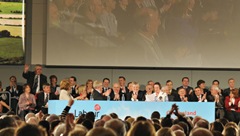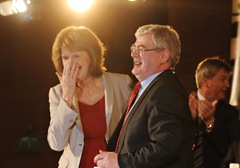No ordinary time
 Meadhbh Monahan reports on “an historic day” for the Labour Party as it agreed to enter a Coalition Government with Fine Geal.
Meadhbh Monahan reports on “an historic day” for the Labour Party as it agreed to enter a Coalition Government with Fine Geal.
As hundreds of delegate cards were waved in the air, signalling an overwhelming vote in favour of Labour going into government with Fine Gael, there was a sense that history was in the making.
“This is no ordinary time and today’s is no ordinary conference,” Eamon Gilmore had told the special delegate conference, ahead of the vote.
As delegates frantically leafed through the Programme for Government ahead of the conference, Gilmore greeted his party faithful as they arrived in droves to UCD’s O’Reilly Hall. “It’s good to shake the hand of the leader anyway” commented one delegate.
Inside, there was standing room only and Labour supporters of all ages – many sporting red jumpers, dresses or ties – listened intently, their attention unwavering during the three-hour debate as to whether Labour should join a coalition or wait until 2016 and push to become the largest party in government.
The message from the doorsteps was that “people want to see Labour as part of this country’s solution, [working] for fairness and balance,” Gilmore reported. He admitted that the Programme for Government “is not the Labour Party manifesto” but added that every section is “driven or moderated by Labour thinking.” He warned the conference that voting against the coalition would mean the programme would be the Fine Gael manifesto on its own.
During the campaign, Labour said it wanted to reduce the size of budget adjustments from €9 billion over the next three years to €7 billion. However, there is no mention of those figures in the Programme for Government. Brendan Howlin, a member of Labour’s negotiating team, told delegates that the two parties had agreed to reduce the deficit by 3 per cent of GDP by 2015 and that “the €9 billion of cuts and taxes that are endorsed by Fine Gael are off the agenda.”
He said: “We have committed to €3 billion [of cuts in 2011] and then to review it to see how we can make rational decisions on the basis of their impact on the lives of ordinary people.” This led to accusations that the programme was simply a continuation of failed Fianna Fáil policies.
Another contentious issue was the introduction of competitive tendering for local waste collection.
SIPTU President Jack O’Connor said that waste collectors were “a barometer for the race to the bottom as far as employment rights are concerned.” He added that SIPTU would be prepared to vote in favour, if it could get a clear undertaking that the clause in relation to contracting out of waste management “does not open the way for unfair competition on the basis of the price of labour, which will inevitably mitigate against the interests of people who work in that industry.” Rather than working against people who work in that industry, Gilmore said it would end the “wild west behaviour” which has driven down services throughout Dublin.
The Programme for Government commits to renegotiating the EU/IMF bail-out deal, however, it has been criticised for its lack of detail on ‘burning the bondholders’. Furthermore, the commitments that there will be no further transfers to NAMA and that the reduction in the minimum wage will be reversed could be interpreted as contravening the terms and conditions of the bail- out deal.
An economic management council chaired by the Taoiseach and managed by the Tánaiste will decide on budgets, estimates and the EU/IMF renegotiations. The commitment to “review” the deeply unpopular universal social charge is vague. A jobs plan will be introduced in the first 100 days of government and there will be no further reductions in social welfare. This is a concession to Labour, as Fine Gael had proposed a €3 cut in 2012 and 2013 and €4 in 2014 and 2015. Another concession to Labour is the commitment that a graduate tax will not be introduced. Both parties had suggested constitutional and political reform in their manifestos and that is also contained in the programme.
 Labour still hurts from the 1987 election when it received only 6.4 per cent of the vote following strict curtailing of government spending that had been implemented by a Labour-Fine Gael coalition. Gilmore put it to delegates that “because of historical precedent we look at how we were punished, but what if we succeed?”
Labour still hurts from the 1987 election when it received only 6.4 per cent of the vote following strict curtailing of government spending that had been implemented by a Labour-Fine Gael coalition. Gilmore put it to delegates that “because of historical precedent we look at how we were punished, but what if we succeed?”
Summing up, Ciara Conway, newly elected TD for Waterford, told eolas: “Today is an historic day. There is a real sense that we are fulfilling what we were campaigning for. This document is one that we can stand over. It addresses the three key areas of jobs, reform and fairness. As one of the youngest TDs in the Dáil, [the Programme for government] is one that I feel is useful to young people in relation to job creation but also access to education and health.
“If we don’t have healthy people, we don’t have consumers; if we don’t have educated people, we don’t have workers. It’s going to be joint-up thinking in government for the first time in a long time.”
What they said
“If you went back to those people who literally fell apart right in front of you and presented them with this document, would they accept it? I think they would.”
Aodhán Ó Ríordáin, Dublin North Central TD
“There’s a proposal in the Programme for Government for the development of the IFSC. Was that not the focus of the collapse of the Irish economy? People hate the banking system.”
Finbar Geaney, President of the Teachers’ Union of Ireland
“In Greece their angry citizens fought on the streets and encountered tear gas canisters, but in Ireland … our electorate waited until the ballot boxes were open and that’s when they dropped in the tear gas.”
Ruairí Quinn, former party leader
“The replacement of a Cowen, Lenihan, Honohan economic and fiscal strait-jacket by a similar Kenny, Noonan, Honohan strait-jacket, that we will also have to wear and support, is not in the interests of the Irish people. The big black hole in this document is the vacuum in relation to banking and fiscal policy. We are simply carrying on those failed policies of Fianna Fáil and the Greens with a few Fine Gael tassels and bells.”
Tommy Broughan, Dublin North East TD
“To turn our backs now on Government would be an act of folly that would alienate a huge section of the 432,000 voters who gave this party their number one votes last week.”
Joan Burton, deputy leader
“I have people living in third world conditions in my constituency; flat complexes that have stalled regeneration projects [and] sewerage and needles coming up to their sink. I’m sick of going to meetings and being told that there’s no money and there’ll be no progress because there’s no political will there. I didn’t march those people up to the top of the hill to turn my back on them when we have the chance to deliver; it’s not right to lead people on.”
Rebecca Moynihan, Dublin south west inner city councilor
“There were t
imes during negotiations when I said: ‘I think we should send for Ming’.”
Brendan Howlin, spokesman on law reform and Europe





